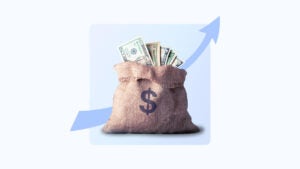How to get a business loan with bad credit

Key takeaways
- It can be hard to qualify for a business loan if you have a FICO Score under 670
- Consider different types of bad credit business loans, such as short-term loans, business lines of credit and SBA microloans, can improve your chances of approval
- You can increase your chances of getting approved for a business loan with bad credit by updating your business plan, choosing the right loan and lender, finding a co-signer and showing strong finances
While a bad credit FICO Score falls between 300 and 579, in the world of business loans, a bad credit score can mean anything less than a FICO Score of 680. And unfortunately, having a fair or bad FICO Score can affect your chances of getting approved for a business loan.
According to the Federal Reserve Banks’ 2024 Small Business Credit Survey, 29 percent of business loan applicants were denied a loan because they had bad credit.
Despite the challenges for approval, getting a business loan with bad credit is possible. The right lender and type of bad credit business loan should provide you with the funding you need. The Small Business Credit Survey also found that business firms with lower credit scores were more likely to approved for a business loan from online lenders.
That said, you can’t expect the best terms and interest rates on bad credit business loans. Lenders may offset the extra risk with rates up to 99 percent or short terms of 24 months or less. Let’s look at strategies for getting a business loan with bad credit.
Can you get a small business loan with bad credit?
You can get a small business loan with a FICO Score of less than 670. But you may end up settling for high interest rates or a bad credit business loan, even if you technically have fair credit.
Because your credit score reflects your history of paying debts and expenses, it’s an indicator of how you might manage a business loan. Having fair or bad credit will limit your loan and lender options. Business owners with a FICO Score in the 500s may need to go with alternative business financing, such as merchant cash advances.
Predatory lenders may attempt to target vulnerable borrowers who may be desperate for funding. Be wary of any lender that promises approval or is too pushy. Be especially careful of anyone who can’t clearly articulate the loan’s terms, according to Patrick Reily co-founder of Uplinq, a credit scoring and assessment platform for small-business lenders. “If they start to tell you stories rather than just give you information, that’s a red flag,” he says.
How to get a business loan with bad credit
Understanding how to get a business loan with bad credit can help you improve your chances of getting approved.
1. Update your business plan
A business plan is a document that outlines your strategy for growing your business long term. Many lenders require a business plan, especially if you’re just starting out.
If you’re not writing your business plan for the first time, you’ll want to update the plan you already have. Common areas to focus on include:
| Section of business plan | What to update |
| Executive summary | Clearly show the key details about your business model, your product’s value and the revenue growth that you expect from the funding. |
| Market research | Get current demographics and data for your target customers. This may be a good chance to dig into focus groups or interviews to get specific feedback about improving your product or service. |
| Budget and future revenue | You may have initially forecast revenue based on market averages. After some time in business, you can update your numbers using your business’s history of revenue growth. |
| Key objectives | Review and share the most important goals your business is focusing on, and the performance measures you’re using to get there. |
| Marketing strategy | Use the updated market research to upgrade your marketing strategy to show how the funding will help you meet your sales goals. |
2. Research and compare bad credit business lenders
You have a wealth of bad credit business loan options at your fingertips, and different types of loans can be used for multiple purposes. When choosing the best business loan for bad credit, think about:
- The loan’s purpose.
- How much you can realistically afford.
- What collateral you have to offer.
- Your ideal repayment length and schedule.
Different lenders tighten or loosen credit requirements based on their mission and the risk level they’re willing to take. Here’s what to look for when trying to choose a bad credit business loan lender:
- Shop around with different lenders. Lenders may offer different loan types, repayment terms and features, such as prepayment discounts for paying off your loan early. Compare the differences between bad credit lenders to find the features that are most suitable for your needs.
- Check the minimum criteria to apply. Lenders set minimum criteria that you need to meet to be considered for funding. Those criteria include annual revenue, time in business and your personal credit score, among other factors.
- Compare interest rates and fees. On top of potentially high interest rates for bad credit loans, you may also pay fees for some types of financing. For example, business lines of credit typically include origination fees or draw fees. See which lenders will offer you the best rates and fees.
- Prequalify to see what type of loan and amount that you can get. Many lenders allow you to start filling out the application to prequalify with a soft credit check, which doesn’t affect your credit score. You can do this for multiple lenders to see which loan offers you the most favorable terms.
- Research the lender’s reputation and customer service. Evaluate the lender’s track record and how they handle customer support.
Types of lenders you might consider include:
- Traditional banks and credit unions. Traditional lenders offer low interest rates for business loans but also have the strictest lending criteria. If you have fair credit, you might qualify for a line of credit or equipment loan. Otherwise, your best bet is to find banks with community programs like Huntington Bank’s Lift Local Business Loan.
- Online lender. You’re most likely to find a lending home with an online lender. These tend to lower FICO score requirements to 600 or lower. While lending requirements are flexible, be aware that bad credit business loans from these lenders typically come with higher interest rates to offset the increased risk.
- CDFIs. Community Development Financial Institutions (CDFIs) are organizations certified to support the development of certain communities, typically minority and low-income areas. Their mission is to offer banking and loan services to underserved businesses.
- MDIs. Minority Depository Institutions (MDIs) are banks and financial institutions that are mostly owned by minority individuals. They’re usually located in minority areas and offer resources like language services.
3. Highlight your business’s strengths
Your business finances play just as important a role in getting approved as your credit. You’ll want to consider the minimum criteria set by the lender, which may include:
- Annual revenue: If you can prove a strong flow of revenue and haven’t recently defaulted on a loan or missed vendor payments, some lenders might approve a loan. Online lenders often want to see at least $100,000 in revenue, and traditional bank lenders may want $150,000 to $250,000 in annual revenue.
- Time in business: You may also have to meet time in business requirements to show stability. These are typically two years for traditional lenders and six months to two years for online lenders.
- Cash flow: Lenders will want to see recent bank statements, usually for at least the last three months. They will be looking to see a positive flow of cash through your business when comparing your revenue to accounts payable.
- Current debts. Lenders will factor in how much debt your business currently has using a debt-to-income ratio and debt service coverage ratio (DSCR). Lenders often want to see a 1.25 to 2 DSCR, meaning that you can more than cover your debts with current profits.
Ways to boost your approval chances with bad credit
Even with a poor credit score, there may be things you can do to demonstrate that you can handle business debt.
Add a co-signer
A co-signer is someone who signs the loan contract and agrees to repay the loan if the business owner can’t make payments.
Finding a co-signer improves your chances of getting approved for a loan if your credit isn’t strong enough to qualify on your own. They can also help you get a lower interest rate since the lender will consider their credit history alongside yours.
While co-signing may help the borrower, the co-signer takes on a huge responsibility and potential burden if they have to make good on their promise.
Offer collateral
Collateral is any asset that you use to back your business loan, such as cash, inventory, equipment or real estate. Putting up collateral means that the lender can seize the asset and use it to pay back the loan if you default. But because the loan is more secure for the lender, you can often get lower interest rates or more favorable terms by using collateral. Business loans for bad credit may require collateral to back the loan.
Work on improving your credit score
If you need immediate cash, you can get a business loan with bad credit today. But if you can wait, take the time to build your credit score. After all, a higher score leads to more favorable business loan interest rates and terms.
A few strategies to improve your personal and business credit scores:
- Check your credit report. You want to understand your personal and business credit score upfront before you start applying to bad credit lenders. This way you know what loans you qualify for. If you see errors on your business credit report, such as an unpaid debt that you have paid, contact the credit bureau to correct the error and raise your score.
- Mind your credit utilization. How much credit you use makes up nearly a third of your FICO Score. The rule of thumb is to keep your credit usage to 30 percent of available credit. Work to pay down debts such as credit cards or lines of credit, or request a credit limit increase if you can.
- Make payments on time. Set up automatic payments for all loans, utilities and business suppliers. That way, you don’t risk missing a payment by accident.
- Apply for a credit card. Getting a business credit card can jumpstart your positive payment history. You can put everyday expenses on the card and pay them off within the grace period to avoid interest. Not every card accepts bad credit, but the Capital one Spark Classic is designed for credit-building with no annual fee to boot.
- Open trade credit. Some commercial vendors let you open a credit line with them when buying supplies. This builds your business credit if the vendor reports your payments to the credit bureaus. You’ll need to pay back borrowed amounts within 30 to 90 days.
Alternatives to business loans for bad credit
If you don’t qualify or need an option other than a bad credit business loan, you could go with these alternative funding options:
- Business grants. A business grant gives businesses free money that doesn’t require repayments or interest. They can come from federal or local governments, nonprofits and corporations. But you’ll have to compete with other businesses to get awarded the grant, so make sure you have a strong application and business plan.
- Business credit cards. You can find business credit cards even with bad credit. For example, the Capital One Spark Classic or OpenSky® Secured Visa® Credit Card. But your options may be more limited or charge higher interest than if you had a higher credit score. You can charge your business expenses to the card, but consider paying off the balance in full each month to avoid interest.
- Crowdfunding. Crowdfunding gives you a way to raise business funds, usually without having to repay. But you might need to offer incentives to investors, like products or even equity in your business, though it may come with valuable mentoring on top of funding.
- Peer-to-peer lending. Peer-to-peer lending allows you to get a business loan from a pool of private individuals lending to you. Like a traditional business loan, you will repay the loan within a set time period and may pay interest. The platform Kiva is a peer-to-peer lending and crowdfunding platform that offers loans up to $15,000 with no interest.
- Special purpose credit programs. Some banks like Chase offer special purpose credit programs, which are programs designed to help disadvantaged business owners get approved for loans. These loans lower requirements for credit, time in business and a down payment.
The 2024 Small Business Credit Survey found that high- or medium-credit-risk businesses are more likely to use funds from the owner or a loan from family or friends than businesses with low credit risk.
The bottom line
Having bad credit can make getting approved for a business loan more difficult, but it doesn’t make you ineligible. To increase your chances, you may need to explore options beyond conventional loans like applying for lenders with lenient requirements or going for an alternative loan.
You can also boost your chances of getting a bad credit business loan by taking several steps, including revamping your business plan and checking your credit report.
Frequently asked questions
Why we ask for feedback Your feedback helps us improve our content and services. It takes less than a minute to complete.
Your responses are anonymous and will only be used for improving our website.
You may also like

Best low-interest business loans for bad credit

How to apply for a fast business loan

What is a bad credit business loan and how it works

Where to get a bad credit business loan


